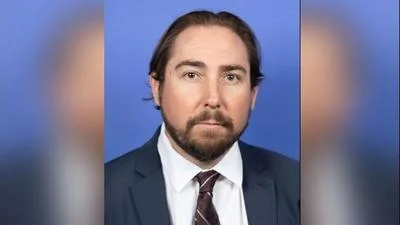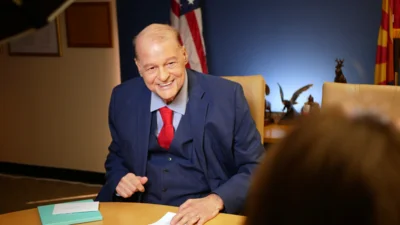Ken Cuccinelli | Facebook
Ken Cuccinelli | Facebook
Democrat Katie Hobbs’ victory over Republican Kari Lake in the Arizona governor’s race wasn’t called until a week after the polls closed. Results of U.S. House races in the state, with control of the House in the balance, are only now trickling in.
The pondering elections process in Arizona undermines voter confidence in elections, even absent “identifiable fraud,” says Ken Cuccinelli, former Virginia attorney general and national chairman of the Election Transparency Initiative.
“It’s a terrible system,” Cuccinelli told the Grand Canyon Times. “They have over 300,000 absentee ballots where signatures have to be matched by hand. And voters have until Wednesday [more than a week after the election] to cure their ballots.”
“The reality is that when counting pauses and stretches on for days, election integrity is compromised in an environment of uncertainty and doubt,” he added.
Under the law, bipartisan boards of election workers verify the signatures and other information on mail ballots. Once the information is verified, the ballot envelope is opened before a bipartisan board and readied for tabulation. But the tabulation of ballots stops for each batch where there is a ballot issue. It does not resume until the issue resolved.
Some sloppiness and mistakes in the processing of the ballots have been cited as well in leading to mistrust in the process.
On Election Day, tabulation machines malfunctioned at numerous voting locations in Maricopa County, the state's most populous county. This led Lake, who ran with former President Donald Trump’s support as an election denier, to urge Hobbs, the secretary of state, to recuse herself from overseeing the elections.
“Arizonans know BS when they see it,” Lake tweeted after the outcome was declared by multiple outlets.
Jason Snead, executive director of the Honest Elections Project, said that the tardy elections results not just in Arizona but other states as well make a compelling argument for election reform.
“First, every state should adopt a photo ID law for every in-person or mail-in ballot,” Snead wrote in a recent commentary. “Vulnerable mail ballots should be protected with bans on organized vote trafficking by political operatives, and drop boxes — if they are used at all — should be secured, evenly distributed statewide and available only during regular business hours.”
“We should have prompt and accurate election results,” he added. “Ballots should be received by Election Day and states should take advantage of pre-processing to speed counting. Post-election audits and process reviews should be used to ensure that vote totals are accurate and that election officials followed the law.”






 Alerts Sign-up
Alerts Sign-up